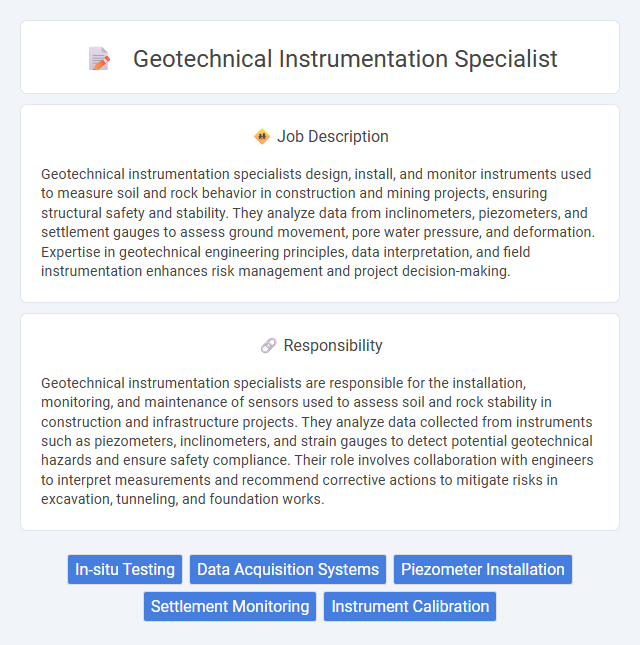
Geotechnical instrumentation specialists design, install, and monitor instruments used to measure soil and rock behavior in construction and mining projects, ensuring structural safety and stability. They analyze data from inclinometers, piezometers, and settlement gauges to assess ground movement, pore water pressure, and deformation. Expertise in geotechnical engineering principles, data interpretation, and field instrumentation enhances risk management and project decision-making.
Individuals with strong analytical skills and a keen interest in soil mechanics are likely suitable for a geotechnical instrumentation specialist role. Those who are comfortable working outdoors, handling technical equipment, and interpreting complex data may find this job aligns well with their abilities. Candidates who prefer routine tasks or limited physical activity might face challenges adapting to the demands of this profession.
Qualification
A Geotechnical Instrumentation Specialist requires a bachelor's degree in geotechnical engineering, civil engineering, or a related field, with advanced certifications in geotechnical monitoring and data analysis enhancing job prospects. Proficiency in software for data acquisition, interpretation, and reporting, coupled with hands-on experience in installing and maintaining instrumentation like piezometers, inclinometers, and settlement gauges, is essential. Strong analytical skills and knowledge of soil mechanics, structural behavior, and site safety standards ensure accurate monitoring and risk assessment in construction and environmental projects.
Responsibility
Geotechnical instrumentation specialists are responsible for the installation, monitoring, and maintenance of sensors used to assess soil and rock stability in construction and infrastructure projects. They analyze data collected from instruments such as piezometers, inclinometers, and strain gauges to detect potential geotechnical hazards and ensure safety compliance. Their role involves collaboration with engineers to interpret measurements and recommend corrective actions to mitigate risks in excavation, tunneling, and foundation works.
Benefit
A geotechnical instrumentation specialist likely enhances project safety by accurately monitoring soil and structural behavior, reducing the probability of costly failures. This role probably improves decision-making through precise data collection and analysis, supporting more efficient construction timelines. Employers may benefit from reduced risks and potential cost savings due to early detection of geotechnical issues.
Challenge
A geotechnical instrumentation specialist likely faces the challenge of accurately monitoring soil and structural conditions under varying environmental factors. Ensuring the precision of data collection instruments in complex, often unpredictable subsurface environments is probable to require advanced technical skills and problem-solving abilities. The role may demand constant adaptation to emerging technologies and regulations to maintain effective and safe project outcomes.
Career Advancement
Geotechnical instrumentation specialists monitor soil and rock behavior using advanced sensors and data analysis to ensure the stability of construction projects. Career advancement often involves gaining expertise in data interpretation, project management, and adopting cutting-edge technologies such as wireless sensor networks and real-time monitoring systems. Progression can lead to senior roles like project lead, consultant, or specialist in geotechnical risk assessment, enhancing professional growth and industry recognition.
Key Terms
In-situ Testing
A Geotechnical Instrumentation Specialist specializing in In-situ Testing expertly monitors and analyzes soil and rock properties directly at construction sites using advanced tools like piezometers, inclinometers, and pressure cells. Their role includes interpreting real-time data to assess ground stability, detect deformation, and ensure safety during excavation, foundation installation, and other geotechnical engineering projects. Proficiency in integrating sensor technologies with geotechnical software enhances precision in evaluating subsurface conditions critical for infrastructure development.
Data Acquisition Systems
Geotechnical instrumentation specialists optimize data acquisition systems to monitor soil and rock behavior accurately, ensuring structural stability in construction projects. Expertise in integrating sensors such as inclinometers, piezometers, and strain gauges with automated data logging enhances real-time analysis and predictive modeling. Proficiency in software tools for data visualization and remote monitoring supports effective decision-making in geotechnical engineering.
Piezometer Installation
Geotechnical instrumentation specialists play a critical role in installing piezometers to measure groundwater pressure and monitor soil stability in construction and environmental projects. Expertise in proper piezometer installation techniques ensures accurate data collection for assessing pore water pressure, which is essential for slope stability analysis and foundation design. Precise calibration and maintenance of piezometers contribute to reliable geotechnical monitoring and risk mitigation in civil engineering applications.
Settlement Monitoring
A Geotechnical Instrumentation Specialist specializing in settlement monitoring utilizes advanced sensors and data analysis techniques to measure ground movements and structural subsidence during construction or natural events. They interpret real-time data from settlement plates, inclinometers, and extensometers to assess soil stability and prevent structural failures. Expertise in continuous monitoring systems ensures accurate early-warning mechanisms for infrastructure safety and compliance with engineering standards.
Instrument Calibration
Geotechnical instrumentation specialists ensure the precision and reliability of soil and structural monitoring devices through meticulous instrument calibration. Regular calibration of sensors such as piezometers, inclinometers, and strain gauges is critical to maintain data accuracy for site investigations and construction safety. Expertise in calibration techniques guarantees optimal instrument performance, reducing errors and enhancing geotechnical project outcomes.
 kuljobs.com
kuljobs.com